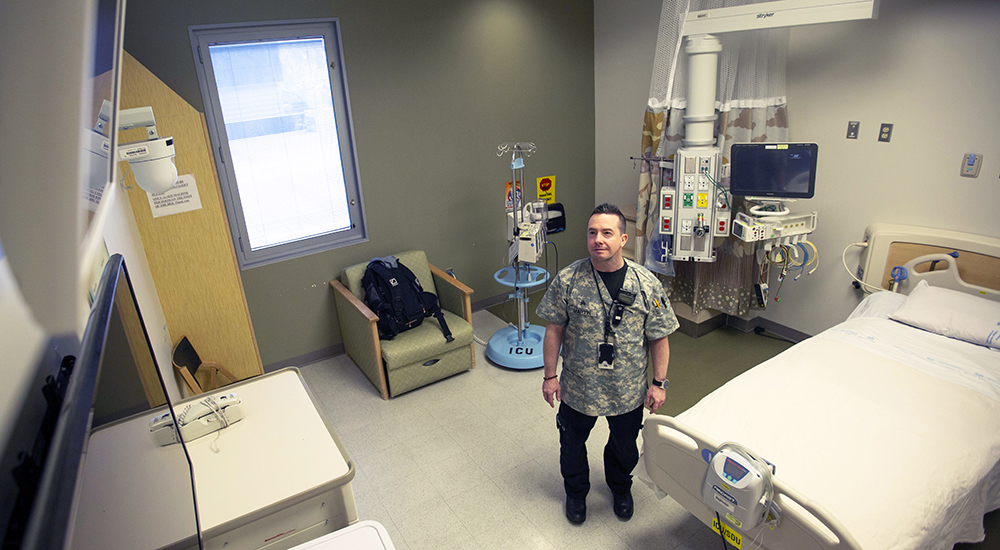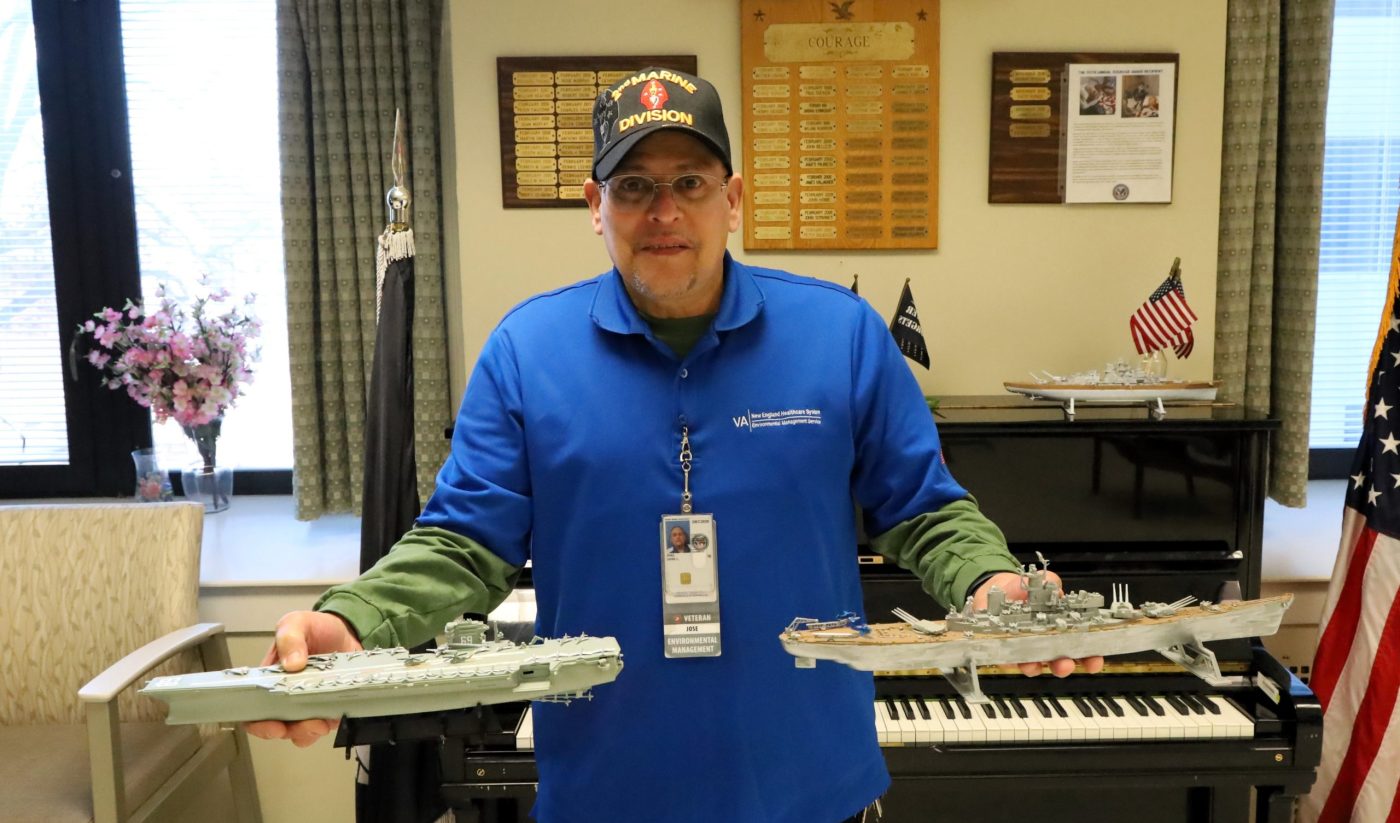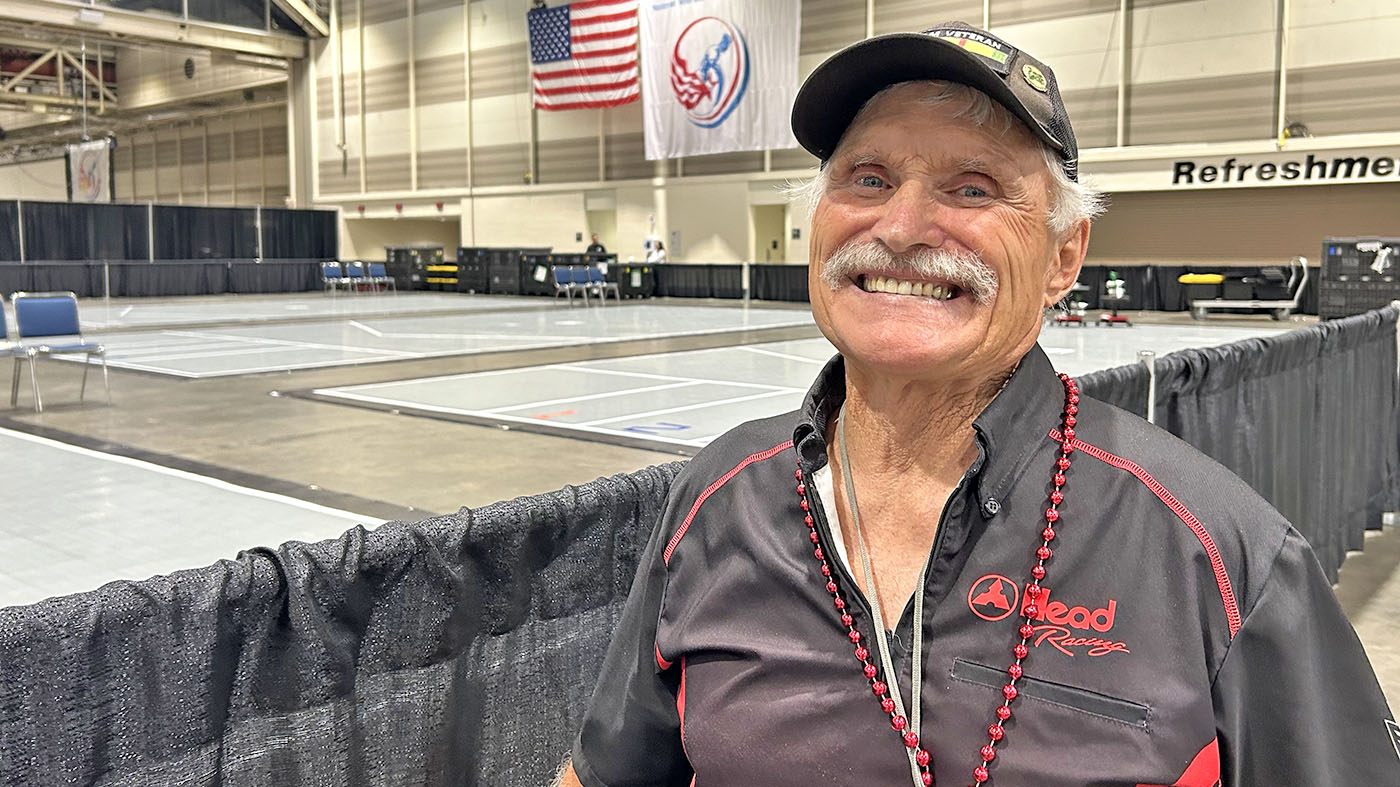Veterans receiving intensive inpatient care in southern Nevada now have access to expanded critical care capabilities thanks to a new telehealth initiative at the North Las Vegas VA Medical Center.
On February 26 the VA Southern Nevada Healthcare System (VASNHS) went live with a Tele-ICU program in its intensive care unit (pictured above). Working in partnership with the VA Midwest Health Care Network’s Regional Tele-ICU System in Minneapolis, this new capability provides local medical staff with around-the-clock bedside access to experts who are specially trained in the care of critically ill patients.
“This technology allows us to bring critical care nurses and intensivists (physicians who provide specialty care for critically ill patients) from all across the country to the bedside at the press of a button,” said Dr. Matthew Goede, associate medical director for the VA Midwest Health Care Network’s Regional Tele-ICU System, and a general surgeon on staff with the VA Nebraska Western Iowa Health Care System in Omaha, Neb. “It allows us to be a second level of support for the doctors and nurses at the bedside.”
With the push of a special “eLert” button, a medical staff member at the North Las Vegas VA Medical Center contacts the Tele-ICU Support Center in Minneapolis, one of the two support centers serving VA hospitals throughout the country. An expert at the Tele-ICU Support Center will then connect into the room via a secure video link and offer assistance, making care recommendations based on a patient’s condition.
“We can access the patients’ records (to include labs and images), monitor vital signs, perform assessments, and provide on-site medical professionals with real-time critical care advice,” said Dr. Robert Bonello, medical director for the Midwest Health Care Network’s Regional Tele-ICU System and doctor of internal medicine at the Minneapolis VA Health Care System. “This allows both ICU teams to make more informed decisions regarding patient care.”At the North Las Vegas VA Medical Center, 12 rooms are equipped with the Tele-ICU capability. As the VA continues to expand telehealth services, the technology could be used in other areas such as emergency departments and acute care rooms in the future. “This really opens up access for our Veterans,” said Shari Kym, VASNHS’ nurse manager for the ICU and Remote Telemetry. “As a specialty, ICU medicine is very limited in the number of intensivists, so this really provides a way for our ICU Veterans to have access to that type of specialty medicine.”
At the North Las Vegas VA Medical Center, 12 rooms are equipped with the Tele-ICU capability. As the VA continues to expand telehealth services, the technology could be used in other areas such as emergency departments and acute care rooms in the future. “This really opens up access for our Veterans,” said Shari Kym, VASNHS’ nurse manager for the ICU and Remote Telemetry. “As a specialty, ICU medicine is very limited in the number of intensivists, so this really provides a way for our ICU Veterans to have access to that type of specialty medicine.”
Filling critical care specialty positions is a struggle nationwide, and the VA and State of Nevada are not exceptions as the state currently ranks 47th nationally for physicians per capita and 48th for nurses. “Intensivists and experienced ICU nurses are at a premium across the country,” said Goede. “Studies show that there is a shortage in many of those specialties. What Tele-ICU allows us to do is amplify the care that these intensivists can provide without having to physically be in every location. It allows for a second opinion, it allows for a second set of eyes, and it provides a good adjunct to the care patients are already getting bedside.”
Partnership with the Air Force
Nearly one in five VA ICU beds are equipped with Tele-ICU technology with the capability currently at 28 facilities in 15 states. In the future, the capability will expand to 40 medical centers in 25 states. The VA also recently launched a partnership to provide Tele-ICU support to the Department of Defense, with Nellis Air Force Base in Nevada becoming the first DoD facility with the technology. “This program started as a critical care collaborative just within our VA network,” Goede said. “But as more and more sites began to get wind of it, we expanded it from there.”
To meet its expansion goals, Bonello said VA network 23 has opened a new Tele-ICU sub-hub in conjunction with the activation of our virtual support program at the VA Southern Nevada Healthcare System. “This will allow VA intensivists to provide care to 20 additional VA medical centers around the country,” he said.
“We’re excited to begin this partnership with the Minneapolis VA and have this added expertise available to our staff and Veteran patients,” said Dr. Ramu Komanduri, VASNHS chief of staff. “By expanding our VA capabilities with a semi-virtual presence such as Tele-ICU, we are able to ensure our Veterans have direct access to the same level of care and services, regardless of where they live.”

Topics in this story
More Stories
One strategy credited for the improvement is a focus on building trust and stronger patient-provider relationships.
Army and Marine Corps Veteran started making models after being hospitalized at Connecticut VA.
Veteran Hank Ebert is a bit of a superstar in the National Veterans Wheelchair Games. He has been attending since 1993.








I have to say how pleased and proud I am to see the sort of developments going on in the VA Health System. Personally I served from 1966 to ’70 including a tour in Vietnam, and have experienced top level health care in the VA System every since I was discharged.
Just recently I happened on a photo and comments from a woman Vet who said that in her health care she felt as if she was treated like a piece of meat. Knowing the competent, caring care I have received, I was hurt to read this, and am expecially pleased to see of Women’s history month and Dr Lleana Howard’s contributions. What a gem she is.
It was heartening to read of Secretary Wilkie’s opinions of President Trump’s budget with respect to the VA. Bravo!
I also have been exposed to tele-care in the Minneapolis/St Paul area. From a satellite clinic, I was administered the med to treat my Hepatitis C Virus. That group would be hard to beat anywhere, and working together, we had success beating my virus!
Also I am pleased to hear of the new website and greater ease of navigating and plain language. Again, Bravo!
My kind regards to all – keep up the good work!
christopher g lane
Ajijic Mexico